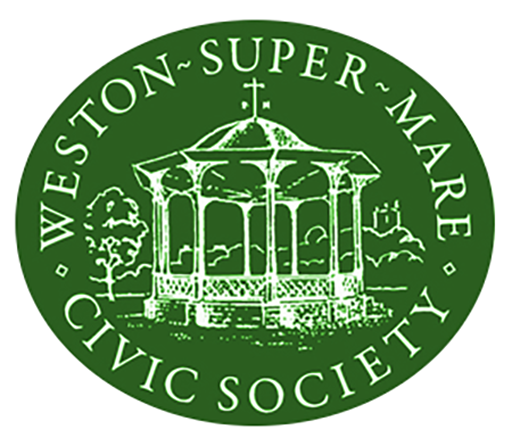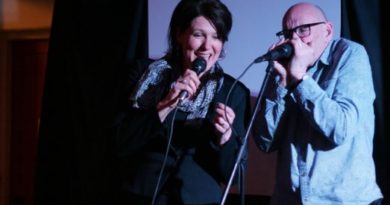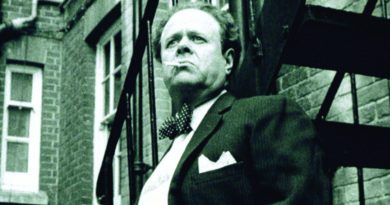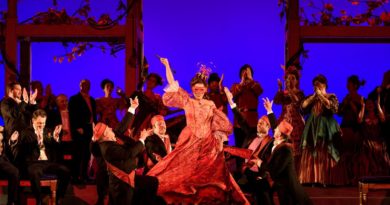Weston History talks at The Blakehay Theatre
This isn’t my first John Crockford Hawley history talk; a couple of years ago, we went to listen to his research on the history of Birnbeck Pier, a evening that was so well attended that we had to sit on the floor in Weston Museum. So it’s no surprise that his latest set of talks on Weston History (like the Birnbeck talk, these are hosted by Weston’s Civic Society) should be a sell-out. I was lucky enough to secure a ticket but scores of disgruntled people were being turned away from the door on this first night and some were furious. It’s a shame that, as Crockford Hawley is a known crowd puller, the 199-seater Blakehay Theatre auditorium couldn’t have been reserved for him and us, rather than its small but admittedly cosy bar.
Spread over four consecutive Tuesday evenings, these talks are thematic in approach, analysing different aspects of Weston’s history from its Iron Age beginnings to present day regeneration, asking whether we can predict our future from our past or whether we even bother to take note. Much of this first talk is, naturally, steeped in supposition. Because much the period covered (circa 6 bce to the early nineteenth century) is either not very well documented or hasn’t been investigated anywhere near fully enough by latter-day archeologists.
After a brief mention of the antiquity of Uphill, John starts his talk proper with the ‘Camp’ or Iron Age Hillfort at Worle/bury Hill, which to me has always been the secretive soul of this entire area. With its carboniferous limestone pits and ramparts, the discovery of grains and bones there and the pure mystery that surrounds its (pre-?) Iron Age past, this hill pulls me in physically several times a week; it’s a place that I’ve written poetry and stories about, somewhere my young daughter and I used to call The Magic Garden. This is the heart of Weston, whose outstanding national monument has very recently been re-registered by Historic England from ‘vulnerable’ to ‘at risk’. At risk from the trees, first planted by that wealthy landowner Symth-Piggott in 1823, that don’t need to be there. Trees that not only obscure the very earthworks that deserve to be the town’s main touristic draw but whose roots are causing History itself damage. Furthermore the lack of signage and an overall neglect of the ‘Camp’ is attracting anti-social behaviour, such as the displacement of the works and the lighting of fires in such an important historical area. It is, Crockford Hawley tells us, highly unusual to have a monument this size in a coastal area and its layout is quirky too.
In his usual enigmatic and fun way, John goes on to tell us about the Roman era in and around Weston, throwing in a bit of beautiful Jesus myth for good measure. We get to hear about the Dark Ages, Weston’s place in the Doomsday Book, the certainty of taxation throughout the ages, the importance of the Calamine industry to Weston (also on Worle Hill), the fishing industry and the Civil War infighting that went on around here. John, glint in the eye, has a way of making you know you’re a local and there are plenty of ‘in’ jokes to make us chuckle. The cut off point for this first talk is 1824, a couple of years after the first holiday guide to Weston was published, a couple of decades before the arrival of Brunel’s railway, when this seaside resort of ours was about to change beyond all recognition, and at the exact time that those damned trees were being planted on Worlebury Hill’s historic monument, so woefully overlooked.
John Crockford Hawley returns to the bar of Blakehay Theatre on:
24th Jan – The Three ‘B’s
31st Jan – Conflicting Demands
7th Feb – Confidence and Doubt
Please note that these talks are now SOLD OUT
For further information on Weston-super-Mare Civic Society, visit their website
See What’s on at Blakehay here
Historic England’s entry on Worlebury Camp
Weston Mercury’s report on Worlebury Camp and its ‘at-risk’ status






Great review, Becky. I’m also a fan of John’s lectures and have been to many over the years; my favourite being a talk on local smuggling in the 18th&19th Centuries. Anyhow, just a mention to those who are disappointed by not being able to get a ticket that there are several local history and archaeology societies in the area who also host lectures, especially this time of year. They certainly could do with some more support. Details can usually be found in The Mercury’s Signposts/Clubs and Societies pages.
Brilliant! Thanks for that information John
Thanks for the review Becky. I was really disappointed to hear of people being turned away at the door. To be fair to the Civic Society they had no idea how popular a series of talks on local history might be and accordingly booked the Blakehay Bar with a seating capacity of 50.
I’m a hint busy at the moment but if demand is there I’d happily book the main auditorium for a late spring one-off ‘performance’ – a 90 minute whizz through our entire story. Anyone want it?
Though sorry to hear of people being turned away from the theatre I am very pleased to see such growing interest in Weston’s history.
I do 🙂 And happy to help get word out if you do decide to give a talk, John